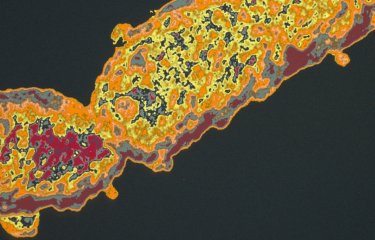Researchers from the Institut Pasteur in Paris and the Institut Pasteur in Lille have analyzed the consequences of intensive vaccination of young children against whooping cough on the bacterium agent of the disease. Their observations highlight the importance of continuing bacterial evolution in order to adapt vaccine strategies.
Press release
Paris, july 8, 2008
consequences of intensive vaccination of young children against whooping cough on the genome of Bordetella pertussis – the bacterium agent of the disease.
Extensive genome analysis was conducted on clinical isolates collected on four continents, in areas where vaccine coverage of young children is high
The results show that the bacteria targeted by the vaccine have been controlled by widespread child vaccination. This observation confirms the success of vaccine campaigns conducted in these countries, and particularly in France, since the 1960s.
Analysis of bacterial genomes shows that current cases of whooping cough are caused by B. pertussis strains that are different from the vaccine strains. Researchers have therefore underlined the importance of adapting vaccine strategies, as recommended by the French health authorities, by using new vaccines for adolescents and adults that no longer target specific bacteria but the virulence factors of circulating bacteria. This type of vaccine has been used in France since 1998.
Scientists have finally observed that some bacterial genetic sequences likely to be involved in bacterial virulence are particularly unstable. They could therefore be gradually eliminated from the bacterial genome. High vaccine coverage, based on these new vaccines which target virulence, could therefore speed up control of whooping cough. Monitoring of the disease in children, adults and senior citizens will enable this scenario to be confirmed.
Source
« Genomic Content of Bordetella pertussis Clinical Isolates Circulating in Areas of Intensive Children Vaccination », PloS One, June 18, 2008.
Valérie Bouchez (1), Valérie Caro (1), Erwan Levillain (2), Ghislaine Guigon (3), Nicole Guiso (1).
(1) Institut Pasteur, Molecular Prevention and Therapy of Human Diseases Unit, URA-CNRS 3012, Paris, France
(2) Institut Pasteur in Lille, Transcriptome and Genome Applied Studies Laboratory – Lille Microarray Facility, UMR 8161-IFR 142, Lille, France
(3) Institut Pasteur, Public Health Platform, Paris, France
Contacts
Institut Pasteur (Paris) Press Office
Marion Doucet ou Nadine Peyrolo
+ 33 (0)1 45 68 89 28 – marion.doucet@pasteur.fr
Institut Pasteur Lille Press Office
Jeanne Agard
+ 33 (0)3 20 87 77 38 – service.communication@pasteur-lille.fr
CNRS Press office
Muriel Ilous
+ 33 (0)1 44 96 43 09 – muriel.ilous@cnrs-dir.fr



